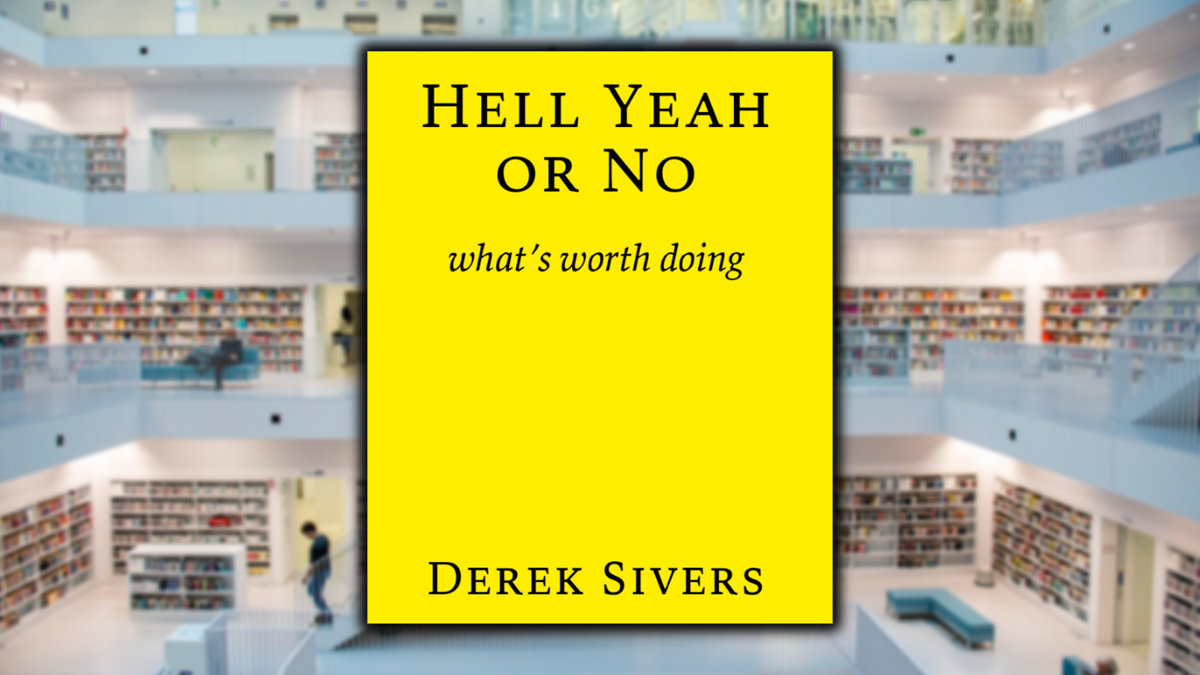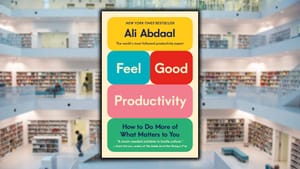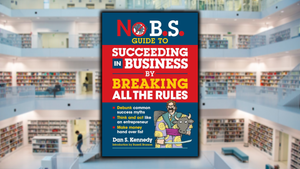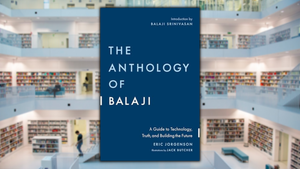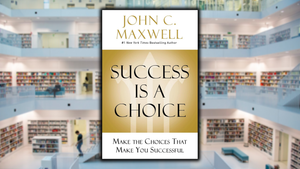
This Book is For:
*Deep thinkers who tend to reject the standard answers given by society to life's most urgent questions, and who want to build a life that's truly their own.
*Young people, especially those thinking of investing large sums of money into their education, who are open to receiving generous, well-intentioned advice from someone who has faced the same challenges as they have and come out the other side happy and free.
*Everyone who sees the value in holding two contradictory ideas in their head at the exact same time, believing aspects of both, and acting intelligently in spite of that contradiction.
*Artists and creatives who want to devote their lives to their art, but who don't feel like starving while they master their craft.
Summary:
"When life or a plan feels ultimately unsatisfying, I find it's because I've forgotten to find the intersection of all three: what makes me happy, what's smart, and what's useful to others."
-Derek Sivers
Certain authors just become associated with particular ideas over time, and one that I continue to profit from handsomely – year after year after year – is Derek Sivers’ insight that when making a decision, it’s either a “Hell yeah!” or it’s a “No.”
Either you’re consumed with interest by what you’ve decided to do - it’s just so completely obvious that this is the thing you should be doing/want to do - or you’re better off not doing it at all.
Hell Yeah or No is a fairly quick read, full of exceptionally useful frameworks for thinking, and I ended up with dozens of book notes and brilliant ideas to think about later. The interesting thing, though, is that many of Sivers' conclusions contradict each other!
Derek is a special thinker in that way. He can calmly and wisely approach big, intimidating questions, and he can disagree with himself multiple times (sometimes even in the same essay), all while getting closer and closer to a tentative answer that he then rigorously tests in the lab of his own life.
He's no armchair philosopher either! I'd even say that he's one of the most interesting people alive today. The dude sold his company, CD Baby, for millions of dollars, enabling him to forget about earning more money (he doesn’t need it or want it), and letting him put every single creative neuron in his brain into his creative work and, you know, living his actual life. And what a life!
In the past, he’s been a musician, a producer, a circus performer, an entrepreneur, a TED speaker, and a book publisher, but here in this book, he’s just your friend Derek.
Another really cool thing is that after the first 5000 limited edition hardcover copies he printed were sold out - raising $250,000 in 6 weeks - he donated the entire amount to help others. In his words:
“Yesterday I wired the entire $250,000 to the Against Malaria Foundation. That will buy 125,000 malaria nets, protecting ~225,000 people, averting ~65,000 cases of malaria, preventing ~125 deaths.”
Pretty damn cool if you ask me! Which you didn't haha. But still!
In the book itself, he prescribes the lifestyle of the happiest people that he knows: Having a well-paying job, while seriously pursuing their art for love, not money.
He writes that we all have a need for stability and adventure, certainty and uncertainty, money, and expression, and when we're out of balance, we need to step back a bit into solitude and silence, and really think through these problems for ourselves.
The book is just full of useful wisdom like this, and he lays out numerous simple though profound mental models to help guide our decision-making. He discusses things like:
*Leaving space and time in our lives so that we can throw ourselves completely into the few things that matter most.
*How good goals shape our actions in the present, not in the future.
*Why it's actually good to be a slow thinker and to change your mind often.
*How to relieve overwhelm by saying no to almost everything.
*Finding the intersection of what's smart, what makes you happy, and what's useful to others.
*The best way to sift through the advice (often unsolicited) that you'll often receive from others who think they know more about how you should live your life than you do.
*Why you should do everything that scares you.
*And a lot more....
Throughout the book, Derek Sivers makes a clear, concise, cogent case for the indisputably true assertion that this one life is your own, and you have to live it in a way that makes sense for you.
No one else on the planet has more at stake when it comes to your life than you do. Making good decisions and living fearlessly according to what you've decided takes astounding courage, but no one is more capable of doing it than you are.

Key Ideas:
#1: If It's Not a Hell Yeah!, It's a No
“Say no to almost everything. This starts to free your time and mind.
Then, when you find something you're actually excited about, you'll have the space in your life to give it your full attention. You'll be able to take massive action, in a way that most people can't, because you cleared away your clutter in advance.
Saying no makes your yes more powerful."
Every single thing that you've said "yes" to in the past is yet another link in the chain, holding you hostage in the present.
When you think about it this way, you'll be a lot less inclined to start shackling yourself to additional chains, many of which represent commitments that don't even serve the person you've since become.
Maybe I'm being a little overly dramatic here, but the point still stands: "No" is a complete sentence, and it's your shield against a life of trivia, distraction, and unfulfilled potential.
I don't mean that saying "Yes" to being a parent, or starting a charity, or developing a skill is the same thing as being a slave, but it's important to realize how hard it is to make significant changes in your life if you're burdened by the weight of decisions you've made in the past.
So whenever you're tempted to add an extra time commitment to your already packed schedule, you may want to consider thinking about it in terms of its cost to your time and possibilities in the future, and how it will prevent you from being able to say yes to other things that you may find more important when that future inevitably becomes the present.
A few things to say here before we move on:
By all means, be nice to people when you're turning down their requests for pieces of your time and attention!
There's no need to rudely brush people off, or wail theatrically about the unfairness of the finitude of human existence, but your life is your life. No one owns it but you, and you need to be extremely intentional about how you live it, or the outside world will attempt to tell you exactly what to do with it, and that may not exactly be in your best interests.
Lastly, protecting your time and your attention gives you resources - literally makes you resourceful - and then, once you do find something you want to dedicate yourself to wholeheartedly, you'll have the mental bandwidth, and the time, to fully pursue it. To go all-in on what you actually want to do with your life.
As they say, it's virtually impossible to overstate the unimportance of nearly everything, and so Derek's filter is an excellent one to employ:
If, when presented with an opportunity, you're not jumping at the chance, saying "Hell yeah!" either out loud to yourself, then just say no. Wait for your moment. Wait for your opportunity. And then give it everything you've got.
#2: What If You Didn't Need Money or Attention?
“We do so many things for the attention, to feel important or praised. But what if you had so much attention and so much praise that you couldn’t possibly want any more? What would you do then? What would you stop doing?”
Who would you be if no one told you who you are?
Who would you be if you didn’t do those things that so many of us normally spend our days doing: coveting praise, chasing money, and seeking validation?
As I've said many times, there's absolutely nothing wrong with wanting to make more money - plus, everyone loves to feel good about themselves. And why shouldn't they?
Wanting to be seen in a positive light by others isn't "bad" in itself. But when it consumes the energy and focus of our entire waking lives, we're robbing ourselves of priceless, productive energy that we could direct instead toward something much more meaningful.
These vain pursuits handcuff us to the actions we've already chosen in the present, and it's even worse if your identity happens to be tied up in how others see you and what you're "worth" economically.
Anything that limits your freedom in this way is limiting your ability to maneuver, to choose a different path.
So why do people waste so much time doing these things, even though, if you were to ask them directly, they'd probably concede that those things aren't all that important?
Well, if you want to understand virtually anything, it's always a good idea to look at the incentives. Who stands to gain from me taking this or that action? Believing this or that idea? Who does it serve? What course of action is incentivized?
Making you feel like you're not "enough" is literally a multibillion dollar industry, made up of car companies, jewelry companies, news and media companies, and so on.
Individually, they're just trying to make a fair profit, and there's nothing "evil" about making people want to buy shiny rocks or fast cars. But collectively, they're robbing all of us of our mental freedom to figure out who we are, what we value, and what we want our one and only lives to be about.
But you don't have to get all tangled up in this.
You can slip out of the handcuffs and begin to ask yourself the deeper questions. Questions like, "Who am I?" That's a great one to start with! And you'll never fully answer that question, not for as long as you live. It's always changing, always evolving, the answer forever moving away from you, calling you to keep asking the question.
So let's return to Derek's question. Say you had all the money and attention and praise that you wanted. What do you do now? Where do you go from here? What's important and real?
#3: Fill Empty Time with Great Things
“Empty time has the potential to be filled with great things. Time filled with little things has little potential.”
How's this for an "obvious" truth that most people ignore for basically their entire lives: time is infinitely valuable, terribly finite, and once it slips through your fingers, it's gone forever and ever and will never, ever return.
You could remind yourself of this eternal truth literally hundreds of times a day, and in my opinion, it still wouldn't be enough. I like to keep bringing that obvious truth back to consciousness again and again and again, every single day of my life.
In one of my favorite time management books of all time, Four Thousand Weeks, by Oliver Burkeman, he writes:
“The world is bursting with wonder, and yet it’s the rare productivity guru who seems to have considered the possibility that the ultimate point of all our frenetic doing might be to experience more of that wonder.”
It leads one to ask, "Did I really find myself on this gorgeous planet, full of fascinating and wonderful people, only to passively scroll TikToks and respond to angry Facebook comments all day long?"
Sure, it's probably one of the "easiest" things to do with your time, and it's certainly what nearly everyone else is doing with their precious gift of life, but do you really want to be "everyone"?
Assuming you live to be 80 years old (and modern medicine is getting goddamn futuristic lately, so many people reading this will probably live far longer than that), you'll have had about four thousand weeks to be alive, active, and conscious.
You can spend this time any way you choose! That's your gift!
You can best honor this precious gift by choosing to fill this time with great things, not small ones. Fill it with love, energy, creativity, generosity, and more life.
#4: What's Obvious to You Might Be Amazing to Others
"Hit songwriters often admit that their most successful hit song was one they thought was just stupid, even not worth recording. We're clearly bad judges of our own creations. We should just put them out there and let the world decide. Are you holding back something that seems too obvious to share?"
This is something that held me back for a long time. It still comes up occasionally: I always assume that everyone already knows what I've just learned.
Over the last 10+ years, I've read more than a thousand books, started two businesses, grew a big online following, etc. etc., and I'm often still surprised when someone expresses shock or amazement after I tell them about something I learned years ago. Has this ever happened to you?
It's far too easy to err in the opposite direction, of course, going around thinking that you know the answer to everything and that nobody will ever have the knowledge base that you have. I think you're going to want to avoid adopting that attitude! But you'd be surprised how common the former situation is!
All of this is to say that there is probably something that you know, or that you've done, or learned, or can do, that is just a regular part of your life, but that would absolutely blow someone else away. Something that's obvious to you, but would be amazing to others. Something that you barely even have to think about, but that to someone else would be revelatory. That they might even gladly pay you for!
Not that you have to turn it into a marketable skill or anything; it's just that maybe you should let the world decide if what you can do is amazing or not.
If I can use myself as an example again, sometimes I'll mention something that I read about in a book years ago, the person I'm speaking with will just get it, and they'll get this...look. I've seen it many times, and it always comes out of nowhere. It's the look of someone who's just had the dirt cleared from their mental windshield because of something I said, something that was just a throwaway statement to me, but that made a measurable difference in their life.
The best part is that this is probably true for you as well!
Or, at least it could be true if you kept working on your art. Or your skills. Or whatever it is that you do that most people can't.
Sometimes, we're poor judges of what's actually amazing, and what's worth sharing. Get the world's opinion before you decide that there's nothing special about you, because maybe it's there and you're just not seeing it.
#5: Admit to Yourself What You Really Want - And Then Fearlessly Pursue It
“You don’t want that horrible regret, feeling like you spent your life pursuing what someone said you should want, instead of what you actually wanted.
For example, if you want to make a lot of money, you need to admit that. If you want to be famous, you need to pursue that. If you want freedom and no responsibilities, or want to learn as much as possible, or whatever else, you need to realize it and embrace it.
Whatever you decide, you need to optimize for that goal, and be
willing to let go of the others.”
One of the things Derek Sivers does best is inspire fearless self-reflection and brutal honesty in others. He helps people see their own blind spots, and lets them know that there's nothing to be afraid of when it comes to gaining self-knowledge.
Some part of you might think that your burning desire to get rich is "wrong" or "immoral," or whatever else, or that you shouldn't want what you actually do want. But, as I'll say over and over again, if you getting rich and famous doesn't hurt anyone, then go for it.
Maybe you'll realize that it wasn't worth it in the end, but then again you may find that it's exactly what you wanted. You'd be doing yourself a massive disservice if you didn't go after these authentic desires with everything you have within you.
"And this above all: to thine own self be true," says Shakespeare's Polonius in his play, Hamlet. That advice is literally thousands of years old, and it's so important.
You have to be honest with yourself, no matter what. And that goes for everything. What you want, who you are, what you're willing to do to get what you want, what's important to you, what you believe...everything. The one person you should never, ever, ever lie to is yourself.
Once the truth about what you really want in life is out there, of course, you can't hide from it any longer. That's probably why more people don't admit these kinds of things to themselves: then they'd actually have to follow through on what they said was important to them.
The worst thing that could possibly happen, though, is to defer your dreams and your desires until it's too late to do anything about them.
Make no mistake: people are going to misunderstand you when you start to articulate your authentic desires and pursue them with intention and vigor. They've lied to themselves their whole lives, and on some unconscious level, it bothers them to see someone else live free and unhindered.
The thoughts and opinions of those people are no concern of yours. If you have a strong sense of self, a clear direction and vision for what you want your life to be, the words and opinions of those other people will start to lose their hold on you. As Derek Sivers writes:
“But whatever you choose, brace yourself, because people are always going to tell you that you’re wrong. That’s why you need to know why you’re doing what you’re doing. Know it in advance. Use it as your compass and optimize your life around it.”
#6: Become a Bat
“The problem is taking any one person's advice too seriously. Ideally, asking for advice should be like echolocation. Bounce ideas off of all of your surroundings, and listen to all the echoes to get the whole picture.
Ultimately, only you know what to do, based on all the feedback you've received and all your personal nuances that no one else knows."
Learning whose advice to take and whose to ignore is one of the most valuable skills that you could possibly develop. It's also fraught with difficulty, because even well-meaning, good-intentioned people tend to give advice based on their experiences, and their worldview, not advice that's going to be specifically useful to you.
It's not usually their fault. Many of these people genuinely want to help you. They just don't know you, could never know you, and that's why you have to be extra careful.
As Derek points out in the book, even people commenting online aren't responding to the real You; they're responding to your online avatar, their representation of you that's taken up residence in their own minds, and you really do have to learn to ignore most of it. Even the good things they say!
This being the case, it's actually rare and valuable to be someone capable of giving great advice, and ultimately, you have to learn to trust yourself.
The same goes for the Stairway to Wisdom, by the way! Of course, I try to present the authors' views and ideas relatively dispassionately, and try to pick out the key ideas and takeaways that are going to be most helpful to the widest range of people. But I write the damn things, and there's just no way that my own personal viewpoint isn't going to seep through into what I write and the advice I give in these pages.
These book breakdowns are an interpretation, and even though I put a tremendous amount of time and effort into preparing them for you, it's still you that has to decide what's relevant to you and what to ignore.
So become a bat! Bats listen to the sound waves bouncing off the objects in their environments, and that's how they "see." Chiropterologists (people who study bats, and a word I looked up just now) are probably cringing right now at my 1-second explanation of echolocation, but that's the basic idea.
You sift through the sound waves - feedback you're getting from others, and the information you consume - and you slowly, over time, begin to build up an idea of what you think. You create your own representation of the world, and become your own chief counsel.
If you ask a thousand people about your business idea and they all tell you that it's a complete waste of time, maybe you'll want to reconsider. But then again, if 1,000 people tell you that it's a waste of time and 3 actual, successful business owners in a similar industry tell you that it might work, those are signals too.
It all comes down to this: don't take advice from people who don't have your best interests at heart, and who haven't achieved the kind of success that you're looking to achieve. Don't take financial advice from broke people, health advice from unfit people, or relationship advice from sixteen year olds.
#7: The Standard Pace is for Chumps
“The system is designed so anyone can keep up. If you're more driven than most people, you can do way more than anyone expects. And this principle applies to all of life, not just school."
One of the things that makes Derek's writing so special, as I've mentioned elsewhere, is that he's able to hold at least two conflicting ideas in his head at the exact same time and see how they might both be true in different situations.
Case in point: "the standard pace," i.e., go through school, get a job, stay there for years, retire, etc., is fine for some people. That might even be the life you want. You can complete a 4-year degree in 4 years, apply for a normal job, raise a family, and be perfectly happy with your life.
But then there are those other people.
You might even be one of them. Those people who crave challenge, who relentlessly pursue freedom, mastery, and creative expression. Those people who are so obsessed with what they're learning that they decide to do the 4-year program in six months, cold email dozens of professionals in their field, practice and/or study for hours and hours every night after work or school, and surge ahead in their chosen craft.
It's just that you have to be brutally honest about which one of those things most accurately describe you, and then do whatever it takes to build a life around what you value.
If you truly and honestly cannot stand to be held back by the "average" expectations reserved for the masses, then you have to acknowledge that, prepare yourself to go all-in on what you say you believe, and then actually go for it.
No one says that you have to slow down so that other people can keep up. Or that you have to downplay your accomplishments just so other people don't feel "bad" about themselves.
Again, it's about keeping two ideas in your head at the same time. You don't have to make a big deal out of the fact that you're moving faster or achieving more than everyone else...you just do it.
You realize that their path is theirs and yours is yours.

Book Notes:
“It’s easy to think I need something else. It’s hard to look instead at what to remove.”
“There are no outsiders.”
“No matter what you say, your actions reveal the truth.”
“Your actions show you what you actually want. There are two smart reactions to this:
1) Stop lying to yourself, and admit your real priorities.
2) Start doing what you say you want to do, and see if it's really true."
“Keep earning your title, or it expires.”
“And if you don’t like the idea of losing your title, then do something about it! This goes for titles like 'leader,' risk-taker,' and 'good friend' too.
Today I updated my website to reflect which of my accomplishments are in the past. It's liberating to speak in the past tense about what you've done, and only speak in the present tense about what you're actually doing."
“One way to get famous is to let others make more money, while you take the spotlight. I learned this while living in Los Angeles, when I got to know some famous Hollywood actors and realized they’re not as rich as you’d think.
The richest people in Hollywood are the ones you’ve never heard of, because they’ve optimized their careers for money. They know that others are willing to take less money in return for more fame, so they profit from the other side of that deal.”
“Before you start something, think of the ways it could end. Sometimes the smart choice is to say no to the whole game."
“Clearing the clutter helps me see the horizon.”
“I’m usually so damn driven, always doing everything as intensely as I can. It was so nice to take it easy for once. I felt I could do this forever, without any exhaustion. When I finished, I looked at the time: forty-five minutes. Wait - what?!? How could that be? Yep. I double-checked: forty-five minutes, as compared to my usual forty-three.
So apparently all of that exhausting, red-faced, full-on push-push-push I had been doing had given me only a 4 percent boost. I could just take it easy and get 96 percent of the results.
And what a difference in experience! To go the same distance, in about the same time, but one way leaves me exhausted, and the other way, rejuvenated.
I think of this often. When I notice that I'm all stressed out about something or driving myself to exhaustion, I remember that bike ride and try dialing back my effort by 50 percent. It's been amazing how often everything gets done just as well and just as fast, with what feels like half the effort."
“You get no competitive edge from consuming the same stuff as everyone else is consuming. It’s rare, now, to focus.”
“The next time you’re feeling extremely unmotivated, do those things you never want to do anyway.”
“Many people are so worried about looking good that they never do anything great. Many people are so worried about doing something great that they never do anything at all. You destroy that paralysis when you think of yourself as just a student, and your current actions as just practice."
“Maybe instead of 'fault' you prefer the word 'responsibility,' but the idea is the same. Think of every bad thing that happened to you, and imagine that you happened to it."
"Most full-time artists I know only spend an hour or two a day actually doing their art. The rest is spent on the boring work that comes with trying to make it a full-time career. So skip the art career and just do the art."
“I continued learning until I felt like an absolute idiot.”
"A new college campus was built, but one thing was still debated: Where in the grass should we put the paved walkways?
Some people thought the walkways should go around the grass, to leave it green. Some thought the walkways should cut across diagonally.
One professor had the winning idea: Don't make any walkways this year. At the end of the year, look where the grass has worn away. That shows where the students are walking. Then just pave those paths. Brilliant.
I think about this idea applied to life plans or business plans. As time goes on, we get smarter. We learn more about ourselves or our customers - what we or they really want. Therefore, we're at our dumbest at the beginning, and at our smartest at the end.
So when should you make decisions?
When you have the most information, when you're at your smartest: as late as possible.
Like the college campus, you can do without walkways for a year. Resist the urge to figure it all out in advance. Realize that now, in the beginning, is when you know the least.
When people expect you to make these decisions in advance, get used to saying, 'We don't know yet.' Then tell this simple story about walkways to show them how wise you are."
“Don’t start a business until people are asking you to.”
“Judge a goal by how well it changes your actions in the present moment. A bad goal makes you say, 'I want to do that someday.' A great goal makes you take action immediately."
"Whatever scares you, go do it."
“If you keep experiencing the same things, your mind keeps its same patterns. Same inputs, same responses. Your brain, which was once curious and growing, gets fixed into deep habits. Your values and opinions harden and resist change.
You really learn only when you’re surprised. If you’re not surprised, then everything is fitting into your existing thought patterns. So to get smarter, you need to get surprised, think in new ways, and deeply understand different perspectives.
With effort, you could do this from the comfort of home. But the most effective way to shake things up is to move across the world. Pick a place that’s most unlike what you know, and go. This keeps you in a learning mindset. Previously mindless habits, like buying groceries, now keep your mind open, alert, and noticing new things. New arrivals in a culture often notice what the locals don’t. (Fish don’t know they’re in water.)”
"Fear is just a form of excitement."
"As you go through life, doing everything that scares you, you fear less and less in the world."
“Life is an ongoing process of choosing between safety (out of fear and need for defense) and risk (for the sake of progress and growth). Make the growth choice a dozen times a day."
-Abraham Maslow
“But the act of reading a book is really about you and what you get from it. All that matters is what you do with the ideas, no matter the source. Apply them to your own life in your own way. It was never about them. It’s about you.”

Important Insights from Related Books:
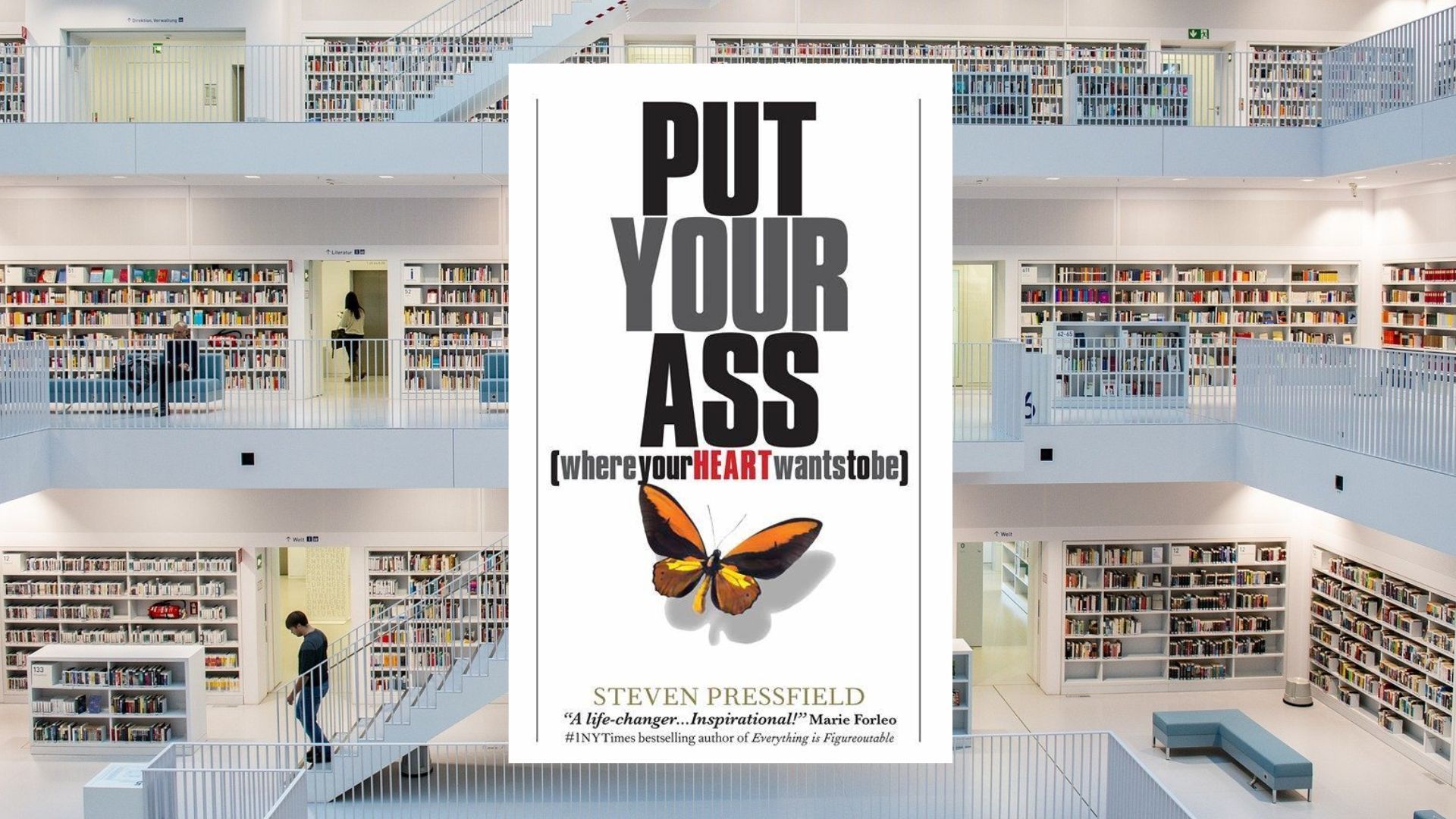
Put Your Ass Where Your Heart Wants to Be, by Steven Pressfield:
Steven Pressfield is essentially the patron saint of artists and creatives everywhere, and this book is a wonderful exhortation toward greater commitment to one’s chosen craft, and a call to go “all-in” on your creative endeavors.
Pressfield just gets it; he’s been there, and after one hell of his own hero’s journey, he’s returned to show us how to “make it” as well. If you're still stuck in the depths of fear, self-doubt, procrastination, and perfectionism, however, then this book could really help you.
At the core level, it’s a book about giving up everything for a dream, and about why doing something “crazy” like that can make life worth living, at least for a certain type of person. You might be that type of person, and if you are, you’re going to feel seen while reading this book as well.
Throughout the book, he blends the practical and the metaphysical in a way that’s just…awesome…and if you believe that you have something great inside of you but aren’t sure how to access it, then you need to read this book.
Sample Quotes from the Book:
“When we say, ‘Put your ass where your heart wants to be,’ we mean station your physical body in the spot where your dream-work will and must happen. Want to write? Sit down at the keyboard. Wanna paint? Step up before the easel. Dance? Get your butt into the rehearsal studio. Dumb and obvious as it sounds, tremendous power lies in this simple physical action.”
“You too have a body of work. It exists inside you, on the Plane of Potentiality. Are you a writer? This body of work exists, like books on a bookshelf. Close your eyes. You can see them.
Are you a musician? These works exist like albums, like concerts, like performances. Listen with your inner ear. You can hear them.
These bodies of work exist as alternative futures. They are that which can be…and should be…and want to be. But they are not that which is guaranteed to be.”
“Can we put our ass where our heart wants to be if we’ve got a family, a job, a mortgage? Yes. The Muse does not count hours. She counts commitment. It is possible to be one hundred percent committed ten percent of the time. The goddess understands.”
Read the Full Breakdown: Put Your Ass Where Your Heart Wants to Be, by Steven Pressfield
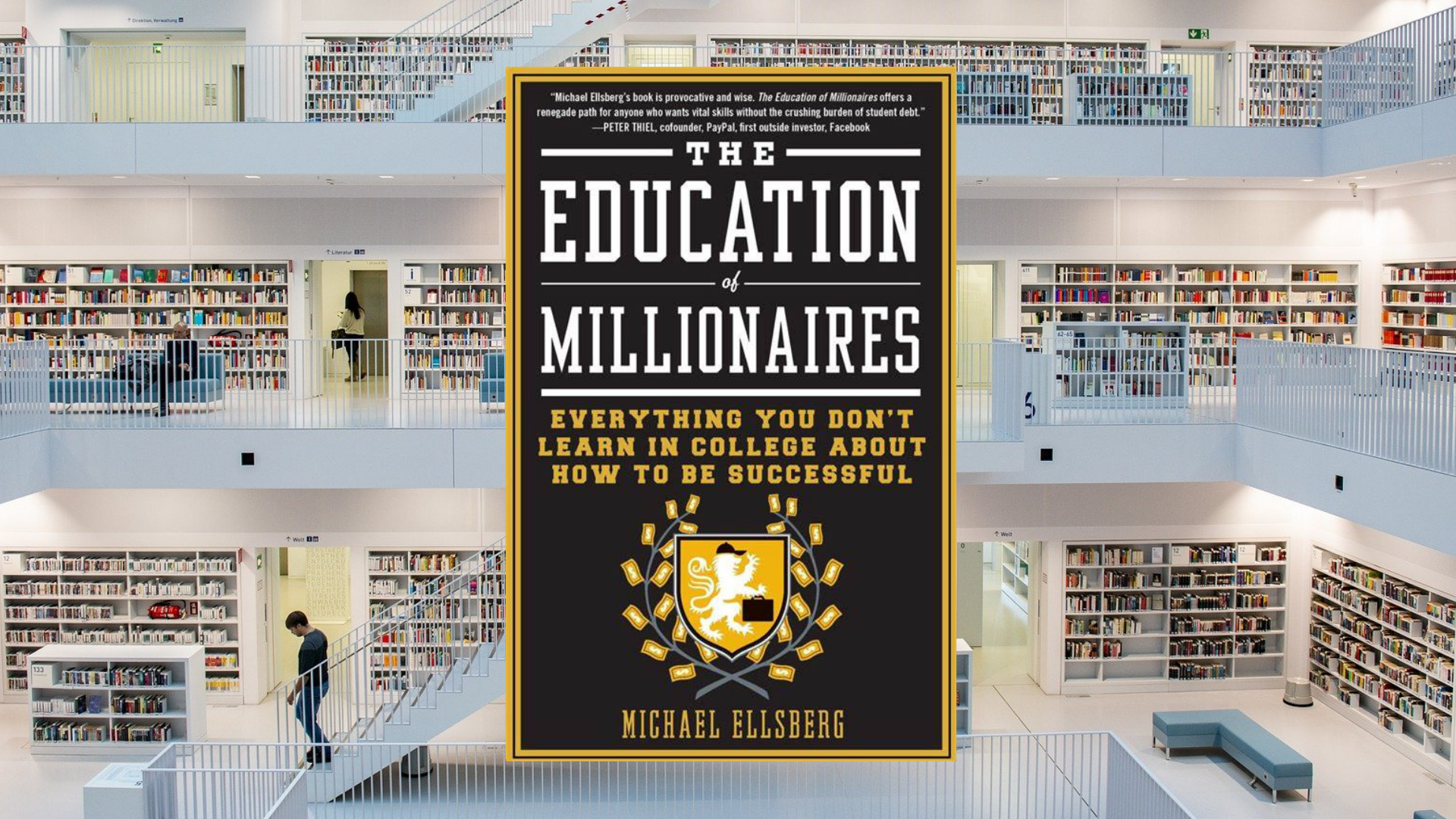
The Education of Millionaires, by Michael Ellsberg:
Just because some of the smartest and most successful individuals in the world dropped out of college or skipped college altogether, does that mean that you should too?
Not necessarily; but in this book, author Michael Ellsberg makes the case that most of what you'll need to learn in order to become successful - by anyone's standards - are skills that you'll never see taught in school.
Teaching any of those success skills would require dozens of books for each one, and Ellsberg doesn't claim to teach you everything you need to know on these pages. But he tells you where to start looking, and what's important to look for.
He doesn't just give you a fish, or even go too deep in teaching you how to fish; he simply explains why you absolutely have to learn to fish, and where to go in order to learn most effectively.
Not only that, but if you're missing any of these critical success skills, you're handicapping yourself horribly and holding yourself back from all that you could achieve and become.
Sample Quotes from the Book:
“I am passionately pro-education. There are few things I care more about than reading and learning constantly. Yet, the lives of the people profiled in this book show conclusively that education is most certainly not the same thing as academic excellence. We’ve conflated them, at great cost to ourselves, our children, our economy, and our culture.”
“You are a reflection of the 20 or 30 people that give you the best advice.”
“The wealthiest people are not the ones who are hoarding the most value – they’re the ones who have the most value flowing in and out of their lives.”
Read the Full Breakdown: The Education of Millionaires, by Michael Ellsberg
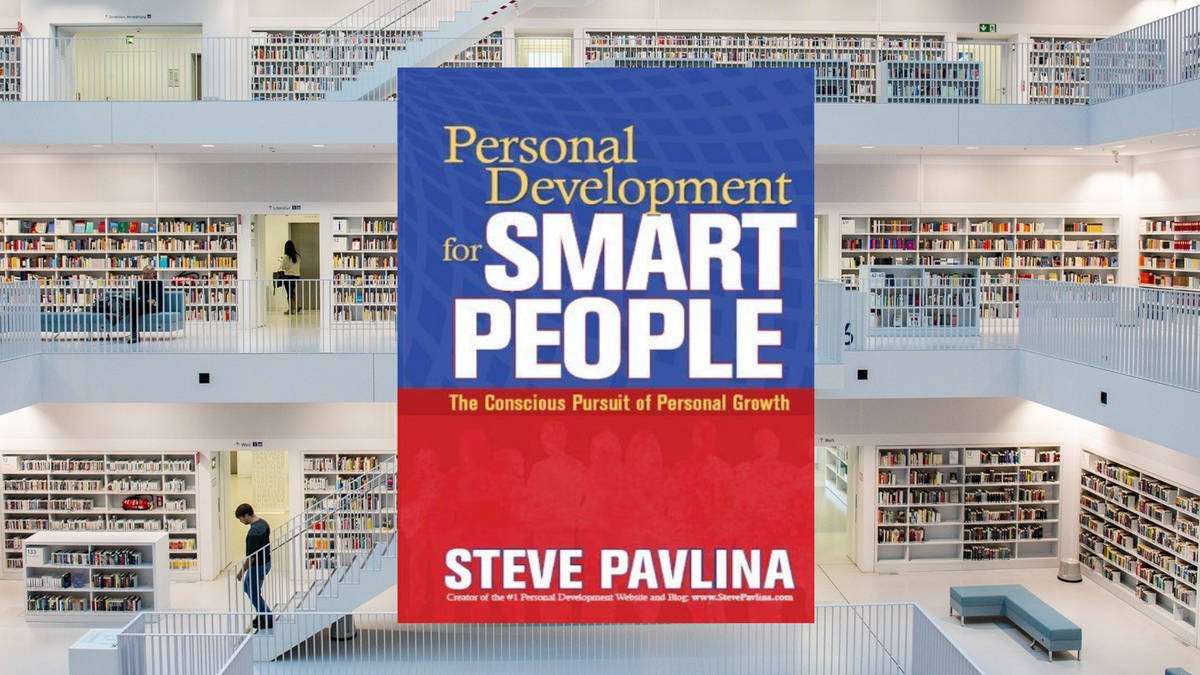
Personal Development for Smart People, by Steve Pavlina:
What does it mean to live intelligently, consciously, and forthrightly in the magnificent and infinitely complex world of which we are a part?
This question and all of its astounding implications was Steve Pavlina's overarching obsession, and after years and years of patient and sometimes restless searching, he now believes that the answer lies in the intersection between three core principles: Truth, Love, and Power.
In Personal Development for Smart People, Pavlina also builds on this foundation by explaining that there are also four secondary principles that follow from the first three. They are Oneness, Authority, Courage, and Intelligence, all of which represent some combination of the first three.
Oneness emerges from truth and love; Authority arises from truth and power; Courage comes from the combination of love and power. All of them together lead to the seventh core principle, which is Intelligence.
Virtually every problem can be thought of as a misalignment between your current mode of thinking and these universal laws of life and the universe.
Sample Quotes from the Book:
"Working on your personal growth may seem like a completely selfish undertaking, but in fact, it's the most selfless thing you can possibly do. As you improve your alignment with truth, love, and power, you increase your capacity to serve others. The more intelligent you become, the more good you can do.
If you haven't already discovered this, you'll eventually realize that when you improve yourself, you inspire others to do the same. Those people then inspire even more people, and your positive ripples of growth ultimately impact everyone. As you improve yourself, you improve all of us. As the cells improve, the whole body improves.
If you forget everything else from this book and remember only one piece of advice, it is simply this: The most intelligent thing you can possibly do with your life is to grow."
"A commitment to growth was the solution to all of my worst problems."
“There’s no rule cast in stone that requires you to assume everyone is separate from you. Something rather magical happens when you presuppose that everyone else is a part of you, just like one of your own dream characters.
The first thing you realize is that there are no strangers. There are no insignificant people in your reality. Since everyone is a part of you, everyone has something to teach you. Loving another person becomes the same thing as loving a part of yourself.
Since all parts of you are worthy of love, no human being is unworthy of love either. Loving other people and loving yourself are ultimately the exact same thing."
Read the Full Breakdown: Personal Development for Smart People, by Steve Pavlina
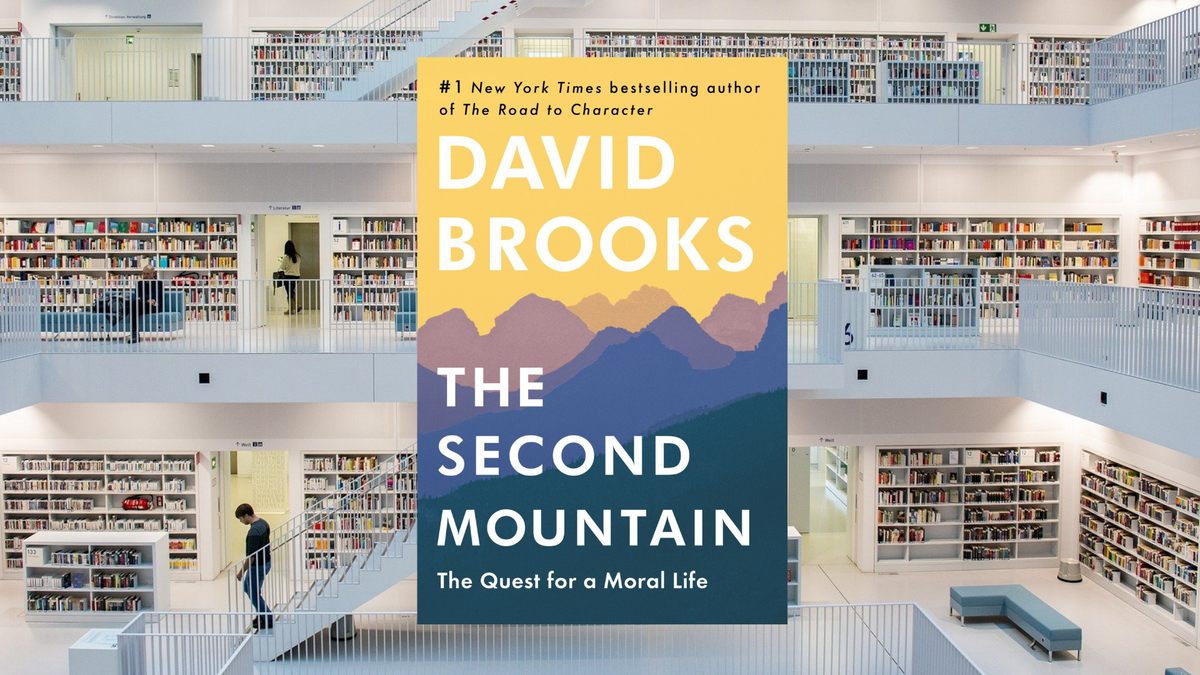
The Second Mountain, by David Brooks:
What if you spent your whole life climbing the ladder to success, only to find that it was leaning against the wrong building?
In this spectacular and damn-near urgent book, political and cultural commentator David Brooks uses a different vertical metaphor - two mountains and a valley - to explore the devastating effects of our culture's unrestrained individualism, the dark night of the soul that's waiting for us when we discover that we've been sold a bill of goods, and what a full life of what he calls "moral joy" might look like.
The "first mountain" represents the relentless pursuit of success and achievement that's possessed the mind of the Western world for so long.
When you climb the first mountain, what you're really cultivating are the "résumé virtues" - the skills and talents you bring to the marketplace. On the second mountain, it's all about the "eulogy virtues" - what they talk about at your funeral.
The Second Mountain is an intensely personal book and one that will stop you cold in dozens of places as you pause to ponder the profundity of what others have discovered about the true aims of life. It can't just be about the self.
A real human life - a committed, relational life - is lived on the second mountain, with others. For others. Brooks explains how we got this all mixed up, and he also offers numerous practical and lofty ideas about how we can restore balance to our inner lives.
He's also fond of quoting George Eliot, author of Middlemarch, although my favorite quote of hers doesn't appear in The Second Mountain. It, however, nicely summarizes Brooks's central idea, and it goes something like this:
"What are we here for if not to make life a little less difficult for one another?"
Sample Quotes from the Book:
“The lesson is that the things we had thought were most important - achievement, affirmation, intelligence - are actually less important, and the things we had undervalued - heart and soul - are actually most important."
"It turns out that freedom isn't an ocean you want to spend your life in. Freedom is a river you want to get across so you can plant yourself on the other side - and fully commit to something."
“Life is not a solitary journey. It is building a home together. It is a process of being formed by attachments and then forming attachments in turn. It is a great chain of generations passing down gifts to one another."
Read the Full Breakdown: The Second Mountain, by David Brooks

The View from the Opposition:
No one's ideas are beyond questioning. In this section, I argue the case for the opposition and raise some points you might wish to evaluate for yourself while reading this book.
#1: The Opposite Could Also Be True
Derek's book is full of places where you could just as easily say, "Yes, but also..." Many times, he'll express an idea or offer a suggestion, and it might end up being the completely wrong thing for you to do. That's what's so great about the book!
He never claims that his ideas are "the answer" to your problems or will directly apply to your situation 100% of the time. So this criticism that many people have leveled against the book isn't exactly valid, but it's worth pointing out.
That being said, it's hard to argue with him, because odds are, he'd probably just say something like, "Yea, good point." Then he'd go off for a few days, think about what you said, and then maybe come back with a counterargument, or maybe concede that you were right all along.
You get the feeling that he'd be terrible in a traditional debate.
But even better than being able to fire back refutations of your position, Derek possesses the even greater skill of being capable of listening completely to what you have to say, critically evaluating it against his own experience, and respecting your right to disagree.
"The test of a first-rate intelligence is the ability to hold two opposed ideas in the mind at the same time and still retain the ability to function.”
-F. Scott Fitzgerald

Questions to Stimulate Your Thinking:
The quality of your questions determines the quality of your life. That's also how you get the absolute most out of any book that you decide to read:
You ask great questions the whole time - as though the book was on trial for its life.
Here in this section are a few questions that can help guide and stimulate your thinking, but try to come up with your own additional questions, especially if you decide to read this book the whole way through...
#1: "For which of your beliefs do you think that the opposite could also be true?"
#2: “What if you didn’t need money or attention? What would you do then? Who would you be?"
#3: "Which possible career paths - or business opportunities - check all the boxes of being smart to do, useful to others, and fun for you personally?"
#4: “What do you hate not doing? How could you move things around in your life so that you're able to do more of that thing?"
#5: "What are you afraid to admit that you actually want out of life? What's stopping you from admitting this to yourself?"
#6: "What's something that's obvious to you but might be amazing to others? Have you shared this knowledge, talent, or ability with others before?"
#7: "Have you ever been afraid of something, did it anyway, and then discovered that it wasn't actually all that scary? Is there something you're currently afraid of that could turn out the same way?"
#8: "What if the fear you're feeling is actually just excitement?"
#9: "Instead of adding more stuff to your life, what could you subtract?"
#10: "Who knows more about how you should live your life than you do?"
"Judge a man by his questions, rather than by his answers."
-Voltaire

Action Steps:
So you've finished reading. What do you do now?
Reading for pleasure is great, and I wholeheartedly support it. However, I am intensely practical when I'm reading for a particular purpose. I want a result. I want to take what I've learned and apply it to my one and only life to make it better!
Because that's really what the Great Books all say. They all say: "You must change your life!" So here, below, are some suggestions for how you can apply the wisdom found in this breakdown to improve your actual life.
Please commit to taking massive action on this immediately! Acting on what you've learned here today will also help you solidify it in your long-term memory. So there's a double benefit! Let's begin...
#1: Create a "Possible Futures" Folder
There are just way too many paths available to us in life to be able to choose all of them. Perhaps that's obvious, but what Derek suggests is filing these alternate futures away for a while where we can find them later.
This encourages us to daydream just for the sake of it. Then, when we're feeling a little bit lost, or simply want to choose our next adventure, we can consult the list and shake things up a bit.
To do this, simply create a Word file on your computer labeled "Possible Futures" - or something similar - and write down as many plans for alternate futures for yourself as you want.
Each plan is one of many possible futures that might happen or not. There's one in which you go back to university for some creative writing courses. There's another one where you enlist in the Army. A third where you start that consulting business for sports trainers, etc.
Your future is wide open, and you'll never be able to live all of these lives, but all your possible lives will now be in one place so you can start living them whenever you want.
#2: Do Something Useless
Not everything you do needs to have a purpose. I know, I know, the rest of society is screaming at us to increase our "productivity" - but we don't have to listen.
We can just do stuff for the sake of it, and you know, enjoy ourselves for a bit while we accomplish exactly nothing.
Step outside your front door and keep putting one foot in front of the other until you decide to turn around and go home. Buy tickets to a show that you have absolutely no interest in, or wouldn't usually go to. It doesn't matter, and it's completely up to you. All that does matter is that you break free of the idea that you have to "become" something.
#3: Flow with Your Demotivation
When you're feeling extremely demotivated, do something that you never feel like doing anyway. It could be laundry, dishes, your taxes, etc. You'll never feel like doing those things, so when you don't feel like doing anything, it won't matter what you do, and you can just bang out these random chores and tasks that you'll never want to do. Problem solved!
#4: Make an Extreme Change
Sometimes, when you're attempting to establish a habit, easing into it just doesn't work. And sometimes, what does work is going all out and using the habits equivalent of a rocket launcher instead of a pistol.
Say you want to establish an exercise habit. Great! Head to the store and buy several changes of gym clothes, dumbbells that you can use at home, a pull-up bar, a gym membership just in case, and hire a personal trainer. Go online and schedule a week's worth of Facebook posts where you tell everyone about your new workout regimen. Walk around the block every single morning, buy a standing desk for your office, and sign up for exercise classes three times a week.
Extreme? Yea! Of course it is! It's absolutely, 100%, over-the-top ridiculous, and maybe that's exactly what you need. Make an extreme change, jolt yourself out of complacency, and dive headlong into your new normal.
"The path to success is to take massive, determined action."
-Tony Robbins


About the Author:
Derek Sivers in 10 Seconds...
"I’ve been a musician, producer, circus performer, entrepreneur, TED speaker, and book publisher.
Monomaniac, introvert, slow thinker, and love finding a different point of view.
California native, I now live in New Zealand."
For Derek Sivers in 10 minutes, see his About page. You won't regret it!
Here's what he's doing Now.
Additional Resources:
All Three of Derek's TED Talks
A Ton of 5-Star Reviews of Hell Yeah or No
Derek's Book Notes for Every Book He's Read
This Book on Amazon:
Hell Yeah or No: What's Worth Doing, by Derek Sivers
If You Liked This Book:
Anything You Want, by Derek Sivers
Put Your Ass Where Your Heart Wants to Be, by Steven Pressfield
Personal Development for Smart People, by Steve Pavlina
The Education of Millionaires, by Michael Ellsberg
The Second Mountain, by David Brooks
The Personal MBA, by Josh Kaufman
Excellent Sheep, by William Deresiewicz
Make Time, by Jake Knapp and John Zeratsky
Awareness, by Anthony de Mello

